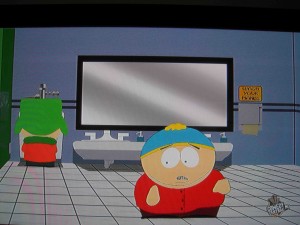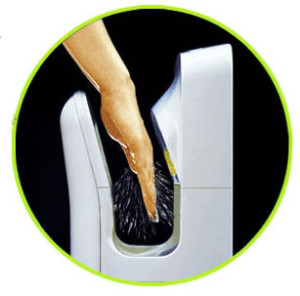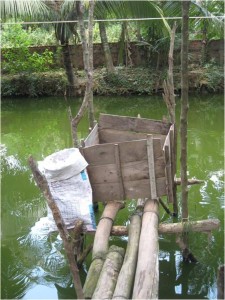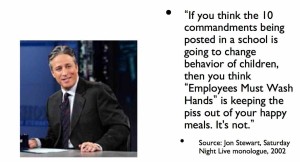Science is about a world–view of a topic and providing the data to back up that view.
Biology is especially messy.
International handwashing day was October 15, but I was busy making a mess.
In Australia, the feds have a nice poster and how paper towel is to be used to dry hands, and I’ve never been in a Western country that has more hand driers than paper towel dispensaries.
Proper handwashing requires proper tools.
Ludwig writes in the current issue of Public Understanding of Science (November 2014 vol. 23 no. 8 982-995) to propose a methodological externalism that takes knowledge about science to be partly constituted by the environment. My starting point is the debate about extended cognition in contemporary philosophy and cognitive science. Externalists claim that human cognition extends beyond the brain and can be partly constituted by external devices. First, I show that most studies of public knowledge about science are based on an internalist framework that excludes the environment we usually utilize to make sense of science and does not allow the possibility of extended knowledge. In a second step, I argue that science communication studies should adopt a methodological externalism and accept that knowledge about science can be partly realized by external information resources such as Wikipedia.
Style is important, but content rules.
In this corner, Dr. Keith Warriner of the University of Guelph (that’s in Canada), who writes there are many old-wives tails, rumors and stories that are so ingrained that we don’t know if they are fact or fiction. The list is so long that a popular TV show called “The Myth Busters” is totally devoted to applying science to verify if myths are true or false. The show is for entertainment but it is when myths or non-substantiated knowledge, are actually applied in regulations and guidelines with the thought that someone must have done the science at some point in time.
As many new mothers in the latter part of the 19th century will verify, hand washing has been an essential intervention for minimizing the transfer of pathogens in clinical, food and other environments. The recommended method for washing hands was developed in 1980’s and has not changed significantly through the years. But is the method supported by science?
Myth 1: Antimicrobial soap provides superior hand washing results compared to normal soap
It has been widely accepted that antimicrobial soap is preferred over normal soap for increasing the efficacy of hand washing. Of all the aspects associated with hand washing the comparison of antimicrobial vs. normal soap has been studied to the greatest extent. The general conclusion is that antimicrobial soap supports a marginal increase in the number of bacteria removed from hands. If high inoculation levels are applied to hands then the removal with antimicrobial soap is statistically significantly compared to normal soap. However, with natural skin microflora there is no difference between the efficacy of normal and antimicrobial soap.
There has been recent research that has suggested that antimicrobial soap can detrimental through disrupting the balance of the skin microflora and irritating the skin. On this basis all the evidence would suggest that antimicrobial soap has no advantages over normal soap.
Myth: Busted
Myth 2: Warm or hot water is better for hand washing than cool water
The FDA have reviewed the recommended water temperature used for hand washing no less than three times. The results of the deliberations was that 110F (43°C) should be set as the recommended temperature in the belief a greater proportion of microbes can be removed. However, all the scientific evidence available suggests that water temperature has no effect on the removal of microbes in the range of 4 -49°C. However, other research in this area has illustrated that water temperature does influence the duration of hand washing with cold or hot water leading to shorter rinse times due to user discomfort.
Myth: Busted
Myth 3: Paper towels are perform better than air dryers
The method used for drying hands following washing is one of the most contentious issues in the hand hygiene arena. The general thought pattern when devising the hand washing guidelines was that hands needed to be dried to prevent acquisition of contamination from surfaces. This is true to a degree but it should also be noted that hand drying can contribute significantly in reducing microbial levels on hands following washing.
The majority of papers published to date have been pro-paper towels and even the “The Myth Busters” returned the same conclusion. However, it should be noted that many of the comparative studies performed the researchers used hot air hand driers that generated a gentle breeze making the user resort to completing the drying process using ones pants. More modern high speed (air blades) driers certainly can dry hands to the same extent as paper towels within 20 seconds. When a comparison is made between air blades and paper towels there is no difference in terms of microbial log reduction or degree of hand dryness. Given that high speed hand driers are not universally available, the evidence would support the view that paper towels are indeed better that hot air driers.
Myth: True
So does it matter if hand washing protocols are not science based?
It is apparent that many aspects of the hand washing protocol are not based on hard scientific evidence but this does not mean it is the wrong thing to do. Still, by reconsidering if anti-microbial soap is really necessary then skin health could be improved. The savings on energy and water usage by reducing the recommended wash time and temperature could also have a positive impact. Regardless of this, we always need to consider the science when devising guidelines.
In the other corner we have Don Schaffner of Rutgers University (that’s in Jersey). Don writes that an Internet troll is defined by Wikipedia as “a person who sows discord on the Internet by starting arguments or upsetting people… with the deliberate intent of provoking readers into an emotional response…”. Doug knows the way to troll me is to send a link and ask me to blog about it (he really just wants to call me a troll).
An article from weau.com features the headline “Simple Sickness Prevention: Hand-Washing vs. Hand-Sanitizer”, and asks: what is more effective, old fashioned soap and water, or the alcohol based hand sanitizer?
Not a bad start. The story goes on to feature Doctor Jaime Marks, Assistant Professor of Medicine at UW-Health, who offers a variety of opinions on hand washing and hand sanitizer use.
Dr. Marks says it’s okay to use either hand-washing or hand-sanitizer.
Hmm. the FDA CFSAN Food Code 2–301.16(A)(3) would disagree, but I think I’m starting to like Dr. Marks…
If you notice your hands are soiled, you’ll want to wash your hands. Hand washing is at least 45–60 seconds, like singing through “Happy Birthday” twice in your head. With hand sanitizer, you’d want to use it for 20–30 seconds.
Whoops. That went off the rails quickly. Dr. Marks is certainly entitled to his opinion, but I’d like to see the scientific peer-reviewed basis for those statements. I’d waged they don’t exist. At least I’ve never seen them.
Dr. Marks continues…
Both are about equal as far as getting your hands clean as long as your hands are not soiled.
Hmmm. Dr. Marks wins me back. Sort of. In fact sometimes hand sanitizers even work when your hands are soiled.
The story concludes with some muddled statements about good bacteria and bad bacteria, building an immune response and getting a flu shot that don’t really hang together, but I’ll give Dr. Marks partial credit for trying. More credit next time if you cite the literature.
Or, according to The Smashing Pumpkins, “Emptiness is loneliness and loneliness is cleanliness and cleanliness is godliness and god is empty, just like me.”
 Ahmer Raja Foods Ltd, which trades as Rajas Pizza Bar on Leeds Road, was fined the bulk of the money, £20,000, for refusing to comply with a number of improvement notices issued by Bradford Council’s environmental health team.
Ahmer Raja Foods Ltd, which trades as Rajas Pizza Bar on Leeds Road, was fined the bulk of the money, £20,000, for refusing to comply with a number of improvement notices issued by Bradford Council’s environmental health team.












